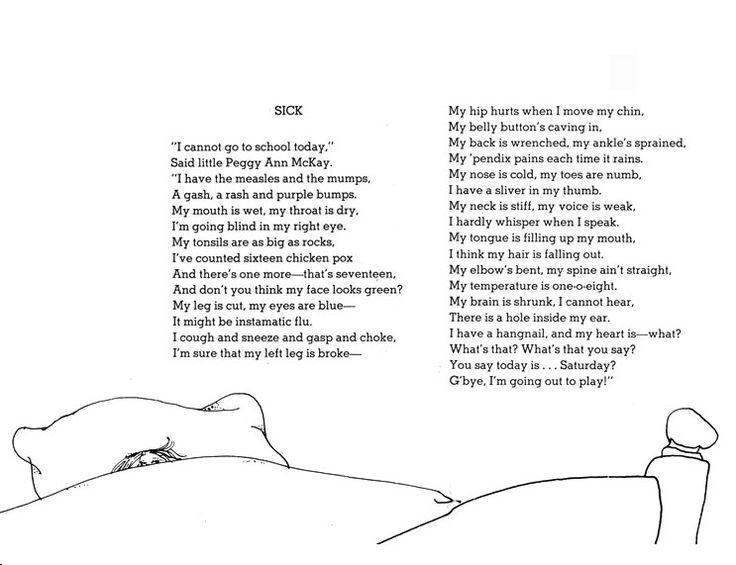Please share!
Recently, when I asked my friends what their favorite reading material was - I got varied responses. Some answered with their favorite childhood book, others answered with adult classics and others responded with what they loved reading to their own kids.
But only two people referenced poetry. And they both called on Shel Silverstein.
And that's because, most people don't like poetry. That includes me. Usually.
One of my friend's reference to Shel Silverstein brought up a memory from so long ago, it was one of those spontaneous remembrances that I have to share. The rawness, the embarrassment, the difficulty with poetry.
In 6th grade, our school had a big musical production. Everyone could try out. I decided, against my better judgment and my own nerves, to give it a go. I chose a Shel Silverstein poem to use and practiced it over and over. And over. And over again. I practiced it in my head. I practiced in front of a mirror. I practiced on the bus.
I do remember this, I had my own copy of Where the Sidewalk Ends. I'm not sure why, but I did. And, I still have that copy. It's sitting next to me right now. The spine of the book is so worn from practicing the poem for this audition, that my copy opens right to page 59.
To a poem called Sick.
I remember being very nervous at the audition, but having a very inviting and trustworthy teacher, Mrs. Von Trebra, at the helm making it okay to try out. In front of everyone. With poetry.
The good news is - I made it through the experience. The bad news - I was so nervous, that I'm pretty sure I read with absolutely no fluency. I just read it out of my head. It had no feeling. I focused on one point on the wall and just got it out.
I felt like I read poetry wrong. I didn't do it justice. And that made me hate it.
But, here's the real poetry. I did it. I went on to not star in the 6th grade production. I had a very small role (incidentally, a role that required me to stare blankly ahead while I delivered my lines) and my mom made the flapper dresses for one of the musical numbers. But still, I made myself experience life.
Even now, I still remember what it felt like to try out in front of everyone. To feel like I didn't "read it right". And, that's how a lot of people feel about poetry - that they can't read it right, understand it or pick good poetry to begin with. And so, many of us don't read it at all. Not to ourselves and definitely not to our kids.
Now, fast forward to when I was at Northwestern and taking a class on teaching writing to kids. A big part of the class was doing a lot of our own writing and eventually, we hit upon a poetry unit. Not my favorite.
Our professor assigned each of us to bring in poetry from our lives for the next class.
The day we were all supposed to bring in our poetry, we went around the room and shared what we brought in. Most people brought in a poem they liked, or a poem that represented their current moment in the universe, or a poem they aspired to in life.
Public speaking was not always fun for me and sharing even just in class is a public speaking event. Now, it doesn't bother me. But 10 years ago, it was always an act of making the private me, public. So, I was nervous to share my poetry. It didn't help that I brought in something totally, and completely different than everyone else. I was putting myself on the line in a big way.
I had a binder shoved full of paper as my poetry. And that paper had baseball stats on it. Yep.
With highlighter marks, to-do lists, circles of important stats. Every year, I was on a fantasy baseball team. And I usually did pretty well at it - or at least, it was something I was very confident in doing in my own real life aside from school and teaching. To become good at fantasy baseball, I managed my team by checking stats, trends and following specific players and their match-ups. I printed it all out, put it in a binder and usually had this binder on my desk. Oftentimes, that binder turned into where I'd write my to-do list, or messages from voicemail or stick a post-it note a student had given me during the teaching day.
That binder was my poetry.
It was the poetry of my life. The idiosyncrasies that I experienced, the observations I made, and the actions that I took. The binder was my rhythm. If writing is one way to express and share observations in life, poetry is just another form of that. You could look through that binder and observe my life happening. Poetry in motion. Living poetry.
I'm still not in love with poetry. Sharing that binder made me more confident in myself, and it took awhile before I happened onto poetry that I loved. But, I still don't like all poetry and some of it is still really hard for me to grasp. I remind myself that songs are poetry too. And, I try a new poem or poet every once in awhile. Just to be sure.
After all, poetry is the rhythm of experiencing life.
And here's a bonus, from my personal collection. In one of our apartments, I was convinced our upstairs neighbors were bowling every night. Or, they had so much stuff, they had to move their furniture around like one of those sliding puzzles so they could move, one square at a time. In any case, I got riled up enough one night, I wrote this haiku:
A quiet night's sleep
Is what everybody needs
Be light on your feet!
I never delivered it. But I keep the original draft in my desk drawer, to remind myself that not all poetry is bad. It can be a great outlet too.




